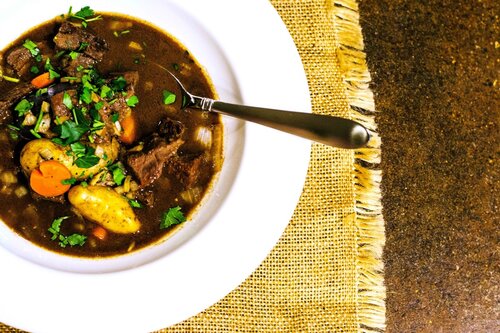Many take the term "luck of the Irish" to mean a wish of good fortune, and while the term alludes to this, the origin of the term is often mistaken. I find myself, and I am sure I am not the only one, thinking of the term to originate from the Irish culture. It however, in fact, does not. Instead, the term is an American born phrase. According to author Edward T. O'Donnell, a professor with Holy Cross College, the term actually has an American origin. "During the gold and silver rush years in the second half of the 19th century, a number of the most famous and successful miners were of Irish and Irish American birth. Over time this association of the Irish with mining fortunes led to the expression 'luck of the Irish.' Of course, it carried with it a certain tone of derision, as if to say, only by sheer luck, as opposed to brains, could these fools succeed," O'Donnell explains.
"There is a charm in making a stew, to the unaccustomed cook, from the excitement of wondering what the result will be, and whether any flavour save that of onions will survive the competition in the mixture." ~ Annie Besant
A cultural and religious based celebration, Saint Patrick's Day, March 17th, is observed around the world and is associated with the shamrock, leprechauns, adorning oneself in green, corned beef, cabbage, festivals and parades, and drinking green beer. For a day, the Irish are celebrated. Like the term "luck of the Irish" itself, some of these celebrations and customs are historically accurate and some are constructed from a vast collection of myths and facts mingled together over time. Untangling the web of myths and legends to truly define what is Irish and what is not, or what is truly a Saint Patrick's Day tradition and what is not would be a difficult and most likely impossible task. One thing is for certain though, embracing the magic and excitement of the day can result in a great meal, like this Guinness Elk Stew!
Traditional Irish stew is created in a slow steaming pot filled with onions and root vegetables, such as carrots, potatoes, parsnips, and turnips. Barley is also sometimes added. The meat is mutton. American twists on the dish trade out the mutton for beef, and in this stew I have traded out the beef for elk. Guinness beef stew utilizes Guinness beer, an Irish stout that has been brewed in Dublin since 1795, for the broth base. The Guinness adds a malty, roasted flavor to the stew and also aides in tenderizing the elk.
I have never made Guinness Stew before, and the stew needs to cook for a couple of hours in order to really develop the flavor. I actually found this recipe on another blog: SeriousEats.com and made some adjustments. This recipe starts with an odd twist I have never tried before and that is adding congealed chicken stock. In a small bowl, add a cup of chicken stock. Sprinkle a packet of unflavored gelatin over the top of the stock and allow it to sit. The stock will start to absorb the stock. I waited a few minutes before sprinkling the remaining three packets over the stock. At the end, I whisked the entire mixture and it formed into little gooey lumps. Set aside this bowl of weird chicken-lumps and also preheat the oven to 275.
In a large dutch oven, heat two tablespoons of oil. Leave the elk in steak size and season generously with salt and pepper. I used a tougher cut of meat for this stew because the slow cooking will allow time for the meat to become tender, and I save my more tender cuts for meals where slow cooking isn't involved. Lay the steaks into the hot oil and allow to brown on each side for three or so minutes. I did mine in several batches because you are trying to seal the flavor of the meat and you want the heat of the oil to remain high throughout the cooking process. Set the meat aside to rest before you cut it into stew size chunks.
Lower the heat just a bit, and using the fat from browning your meat, quickly sear four onions, five carrots, and four cloves of garlic. I just rough chopped these vegetables, as they are not for eating and instead for adding flavor to the stew base. Take about four or five minutes to lightly brown the vegetables. Add the chicken stock gelatin to the dutch oven along with a quarter cup of brewed coffee, fish sauce, soy sauce, and Worcestershire sauce. Use a wooden spoon to scrape the bottom of the pan and pull up all that flavor from browning the meat. Also, add the two cans of Guinness beer and the bundle of fresh parsley, thyme, and bay leaves. Now, you could use whatever beer you have on hand for this stew, but then you must announce that you are making Beer Elk Stew and not Guinness Elk Stew, that's a rule! Bring the pot to a boil and then reduce to a simmer.
Once the meat has cooled enough to handle, cut the steaks into bite sized pieces and toss them with a tablespoon or two of flour. Take the time to make sure you have evenly coated the meat pieces and don't have big chunks of flour hanging out in the bowl. Pour the elk meat and any juices in the bowl into the dutch oven, place the lid just partially on the top of the pot, and transfer to the oven. Allow to cook for one hour. Give everything a stir every twenty minutes or so.
After an hour of cooking, it is time to add the potatoes. You can use whatever potato you would like: russett, red, yellow, white, or petite. I like to use the fingerling potatoes when I make stews. They add to the rustic vibe of stew and you also don't have to cut them up. They are already bite-size! Add the potatoes and allow the stew to continue cooking an additional thirty minutes.
While the potatoes are softening, dice up some more carrots and onions. You could also do parsnips or turnips too. Once the thirty minutes are up from when the potatoes were added, pull the pot from the oven and remove the large chunks of onions, carrots, and the bundle of parsley. Skim off any accumulated fat from the top of the stew, although elk meat is so lean that you might not have any. I did not.
Pour in the diced carrots and onions, and return the pot to the oven for 45 more minutes. Leave the lid partially cracked.
Serve yourself a steaming bowl of Guinness Elk Stew with a fresh poured green beer and a slice of Irish soda bread, the perfect meal for Saint Patrick's Day or any other night of the week!
Happy Hunting!

Elk Guinness Stew
Ingredients
- 4 packets unflavored gelatin
- 1 cup chicken stock
- 3 pounds elk meat, left in steak slabs
- 2 tablespoons high heat oil, such as vegetable
- Four onions, halved
- 5 carrots, roughly cut in large chunks
- 4 cloves garlic, smashed
- 1/4 cup brewed coffee
- 1 tablespoon fish sauce
- 1 tablespoon Worcestershire sauce
- 1 table spoon soy sauce
- 2 16 ounce Guinness beers
- Bundle of parsley, thyme, and bay leaves
- 1 to 2 tablespoons flour
- 1 to 2 pounds fingerling potatoes
- 3 carrots, small diced
- 1 onion, small diced
Instructions
- Preheat the oven to 275 and place the cup of chicken stock in a bowl. Pour one packet of gelatin over the stock. Allow the gelatin to dissolve in the stock before adding the remaining three packets. At the end of four packets, stir the gelatin. It should form into small congealed balls. Set aside.
- In a heavy bottom pot or dutch oven, heat the oil over medium high heat. Add the steak slabs in small batches, so the temperature of the oil remains high. Brown each side for three to four minutes and then flip. Set meat aside to rest.
- Leaving the drippings in the pot, add the onions, carrots, and garlic. Brown for four minutes. If needed, reduced the heat to medium so the garlic does not burn.
- Add the coffee, fish sauce, Worcestershire sauce, and soy sauce to the pot. Scrape the bottom to remove any drippings from the pot bottom. Add the Guinness beer and bring to a boil. Place bundle of parsley, thyme, and bay leaves into pot. Reduce the pot to a simmer.
- Cut the meat into bite size piece. Place in bowl and coat with flour, ensuring even covering. Add meat to pot, place lid partially over, and place in oven. Allow to cook for one hour, stirring every twenty minutes or so.
- Add potatoes, cook an additional 30 minutes.
- Add diced carrots and onions, could also add parsnips or turnips too. Cook additional 45 minutes.








